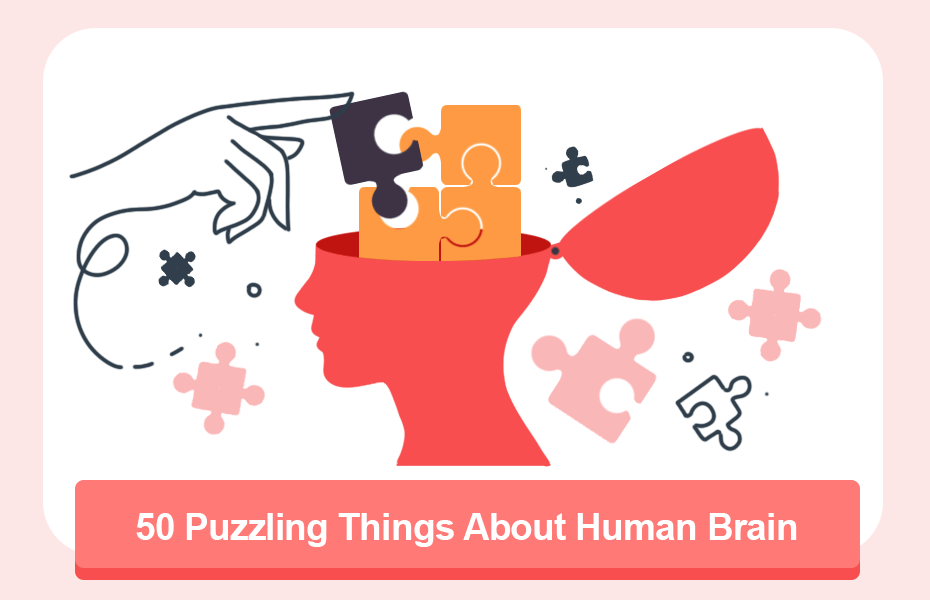50 Puzzling Things About Human Brain
The brain is one of the least explored organs in the human body. Most experts confess that the most astonishing facts are still yet to enter mainstream awareness. Safely packed in a bony shell, this bunch of billions of neurons of 1.5 kg weight hides lots of mysteries and magic powers to be discovered. Revealing new brain data is a fascinating activity and it attracts the attention of neuroscientists from all over the world. In their quest to get access to deep brain resources, they expect amazing things. We’ll try to dispel myths and update some information about the brain’s work. The latest science shares with us a deeper knowledge about this gray matter. Let’s download this data into our brain as well.
Brain: Unsolved Mystery or Common Body Organ?
Our brain is actually part of the central nervous system and acts as its command center. As an average organ, it is responsible for a number of main functions:
- regulates breathing and blood pressure;
- processes sensory information;
- releases hormones.
Every second, this mass of nerve tissue protected by the skull sends and receives an enormous amount of information.
It gets an input from sensory organs and forwards output to muscles. Our brain participates in the work of every other body organ and system. It conceals so many unstudied functions that can be considered the most mysterious body part. We are going to unmask some of them.
Facts About Brain Physiology and Function
The brain physiology and functions are really extraordinary. Talking about its anatomy, the largest part of our brain is the cerebrum that consists of two hemispheres. The outer layer of the cerebrum is the cerebral cortex, which includes four lobes: temporal, frontal, parietal, and occipital. The humans have the largest frontal lobes that are associated with logic, planning, and abstract thinking. The parietal lobe integrates all received senses, and it is responsible for spatial orientation. Language and sounds are processed by the temporal lobe. The hippocampus belongs to this lobe, as well, playing a significant role in emotions and memory. The occipital lobe, located at the back part of the skull, processes visual images.
The cerebellum is beneath the cerebrum and regulates motor control, balancing our coordination and performing some cognitive functions.
The tissue of the cerebrum is squishy and soft, resembling the consistency of gelatin or tofu. Every day it produces cerebrospinal liquid and floats in it to keep protected from being crushed by its own weight.
The human brain is comprised of up to 100 billion neurons. They are all interconnected and can be linked with 10,000 other nerve cells. The neurons transmit and receive electrical impulses from each other, allowing us to develop ideas and recall memories. The brain energy consumption makes up 25 watts. This power is enough to illuminate a standard light bulb.
Blood arteries that nourish our mind provide it with two incredibly vital nutrients, oxygen and glucose. Deprived of these elements for 3-5 minutes, the brain undergoes irresistible damage. When our mind lacks a sufficient amount of oxygen, it makes a person yawn to cover this oxygen deficiency. This act also serves as a cooling function for an overheated brain. In fact, highly increased body temperature during a fever (more than 42 ⁰C) can cause brain damage as well.
The brain has no pain receptors and cannot feel pain. When we get a headache, it is caused by sensations in adjacent joints, skin, and muscles, but not in the brain. It explains the phenomenon, how the brain surgery can be carried out, and when the patient is awake and feels no pain.
Does Size Really Matter?
In the case of the brain, bigger dimensions don’t mean being smarter or better. An average size of the brain is 3 pounds (1,400 g). Male brains are 10 percent bigger than female’s, however, the female’s hippocampus is larger.
Newborns usually have big heads to hold their brain, which is rapidly growing. The brain of a 2-year-old baby is 80% of the size of an adult male’s.
Neanderthals had a larger brain than that of Homo sapiens. In the process of evolution, our body shrank, so the brain did too. It also has undergone development over the past 20,000 years. We are getting smaller brains, and the volume we have lost is the size of a tennis ball. As we get older, our brain gets smaller as well, starting after middle age.
In proportion to body weight, humans have the largest brains of all animals, but not the biggest ones in general. This honor belongs to sperm whales which have 17-pound brains.
The human brains also include more neurons per volume unit and have an ability to form folds in the cortex, like in monkeys and dolphins. On the contrary, mice have smooth brains.
A Bit of Statistical Data and Calculations
Some numerical facts will help us to understand our brain better.
- The brain occupies only 2% of the total weight of a human body. However, it consumes 20% of its oxygen and energy supplies. This energy is mainly used for the production and growth of cells, and the rest of the utilization is to maintain impulses between neurons.
- The brain is 73% water. Even 2% dehydration affects our memory, cognitive functions, and attention. Excessive sweating for 90 minutes in a row can shrink our brain similar to the shrinkage from one year of aging.
- 60% of the dry brain’s weight is fat. It is the highest fat concentration organ in the human body.
- High cholesterol is not as bad as it is depicted. On the contrary, it reduces our risk of developing dementia. 25% of all human cholesterol resides in the brain forming its cells. On the whole, it houses more than 86 billion cells. They are all unique and make up to 10,000 different types of neurons.
- Information within the brain moves at the speed of 268 miles per hour, while race cars reach a maximum speed of 240 mph.
- Brain tissue of the size of one grain of sand is comprised of 1 billion synapses and 100,000 neurons with nonstop communication.
- Approximately one liter of blood circulates through the brain every minute.
- The brain of an average person generates more than 50,000 thoughts a day. As scientific research shows, 70% of them are negative and contain self-criticism, fear, etc.
- The human cerebrum reaches its maturity at the age of 25. Until this moment, teenage brains are forming.
- During one second, more than 100,000 chemical reactions occur within our brain.
These statistics are only the tip of the iceberg. The human brain stays one of the lesser studied topics and needs deeper and more thorough investigation.
Memory and Learning
Early knowledge about human memory abilities featured memory as photographs recorded by a camera. In fact, the human mind works another way. Every recorded experience is affected by a person’s emotions, motivation, speech, and other things. The brain doesn’t store memories in one place. Primarily, they are deconstructed and spread among its parts for storage. When we need to recall some particular memory, these fragments are reconstructed.
The brain slows down its activity at age 24, but various cognitive skills may develop at different ages. No matter how old you are, some abilities may sharpen at any age, even at the age of 70. We can get better at some things and get worse at others.
The phenomenon of forgetting things when people are drunk is explained by the fact that in the condition of alcohol intoxication, the brain cannot form memories. Ethanol affects our mind by making unsteady walk, slurred speech, or blurred vision. These effects disappear when a person becomes sober. With permanent alcohol consumption, these effects can become irreversible and reduce cognitive functions.
We admire people with exceptional memories, but these abilities are rarely inborn. Every memory master knows that an outstanding memory is a result of professional techniques.
Frequent jet lag effects can be harmful for the human memory, because released stress hormones damage the temporal lobe.
Reading aloud significantly promotes brain development and memory. This important discovery should be used when upbringing kids.
Our brain remembers images better than text. The information presented orally is memorized only to 10%, but can be up to 65% with images added.
One more research proves an interesting fact that the order of letters in words during reading doesn’t actually matter much. Our mind needs the first and the last letter to be in the right spot in each word for an adequate content understanding. Memory rearranges them, making sense even of a jumble of letters.
Our short-term memory is able to hold a maximum of 7 digits. This explains why all telephone numbers are 7 numbers long.
Human Brain vs Computer
Sometimes we compare our brain with such advanced technologies as a computer, switchboard, or the internet. It is hard to believe, but our mind is far more superb than the most powerful computer ever existed. It is able to compute and solve problems quicker, because in raw data, it is capable to calculate 10 to the 13th power operations per second.
Besides, the storage capacity of our mind is unlimited and makes up one quadrillion bytes. This amount can store the whole internet. In the process of moving information within the system, our brain is 30 times faster than the most powerful supercomputer.
Weird Brain Behavior
Working as a perfect and flawless mechanism, our brain sometimes acts fallible and illogical. Almost 200 cognitive distortions may become a reason for its irrational functioning.
Memories are very unreliable things and can change depending on motivation, emotions, and context. Traumatic events may cause “flash bulb memories.”
People with mental disabilities may be born talented in one particular sphere: art, music, mathematics, etc. This is called savant syndrome. Ordinary people may also acquire ingenious abilities after brain trauma.
Some people may have the phenomenon of synesthesia. In this condition, stimulation of one sense of perception awakes another one. Because of hyperconnectivity between different sensory areas, such people are able to smell sounds and taste words.
Neuroplasticity is the unique brain ability to be changed and reorganized throughout our life. The part of the brain responsible for visual perception in blind people adapts itself to process sound information instead of working with eyesight.
Playing evil jokes with us, this extraordinary organ is responsible for the strangest brain disorders, like:
- Cotard’s syndrome (Patients believe that they are dead.);
- Capgras syndrome (Patients think that their loved ones are substituted by aliens or robots.);
- exploding head syndrome (Patients hear phantom explosions in their heads.).
One more weird fact is that people from 18 to 35 are unexpectedly more prone to forgetfulness even than elderly ones.
Is Our Style of Life Harmful?
The modern lifestyle affects our brain, and often not in a good and positive way. If we are used to experiencing regular stress at work or depression, it may lead to the brain shrinkage.
Our everyday food lacks important nutrients necessary for proper brain functioning. Meals low in essential fats (precisely omega-3 fatty acids present in sea fish) cause brain shrinkage that equals 2 years of brain aging. Low-fat diets are especially dangerous. To escape starvation, brain cells can eat themselves as a last energy source.
As well as food deprivation, lack of sleep also acts as a brain cell killer. 7-9 hours of sound sleep is the average recommended rest period which is important for our mind and body. It is a necessary condition for an adequate brainwork, reaction time, and memory. Sleep deprivation may cause psychosis, impact our cognition, and limit the innate healing abilities of our mind and body.
Nowadays, a lot of jobs demand the multitasking skills of an applicant. In fact, we cannot concentrate on two different things at once. Our mind can only switch between the tasks, but not perform them simultaneously. Unfortunately, such shifting diminishes attention span, short-term memory, and the ability to learn.
The exposure of electromagnetic frequencies emitted by modern electronic devices has a negative impact on more than 100 brain proteins. The era of convenient cell phones has its drawbacks, too.
Again, usage of up-to-date navigation systems destroys our natural sense of direction. This skill has been developed and improved by our ancestors for centuries. As we now rely on GPS and no longer use the brain areas responsible for navigation, these neural connections gradually expire.
Since the Victorian age, we have lost 1.5 points of our average IQ per decade. Since those days, we have become less intelligent in total by about 13.35 points.
Several Facts Busted by Modern Science
Neuroscience is rapidly developing and presents a lot of new information because a lot of data becomes outdated fast. Numerous myths that surround our brain contain misinformation, and modern experiments have proven that some of them are not true.
For example, the common opinion that people use only 10% of their brain capacity is absolutely wrong. Research shows that we use almost the whole brain, even when we are asleep.
Another is the belief that all people are divided into right-brain and left-brain persons having a particular type of skill. That is false, because we use the whole brain all the time.
The length of all blood arteries was considered to amount to 10,000 miles. Actually, they make up only 400 miles.
The myth that we are born with a certain number of brain cells and a set intelligence level has been debunked. Due to the brain plasticity, our brains can change during our lifetime and form new cells.
The well-known “Mozart effect” seems also to be inaccurate. Listening to music can improve one’s memory and concentration, but listening to Mozart in particular causes no unique abilities.
Further investigation into neuroscience may bring more updated information that can prove other recognized facts untrue.
Can We Really Improve Brain Ability?
Naturally, following some rules and conditions, we are able to improve our brain ability and prevent it from harmful influence and various diseases.
As you know, the blood-brain barrier is a sort of protection that doesn’t allow alien substances to penetrate into the cerebrum from the vascular system. However, some substances succeed in slipping past it. Nicotine reaches the cerebrum in 7 seconds, while alcohol needs 6 minutes to reach it. Excessive smoking and drinking destroys for the brain, so get rid of these bad habits.
Try not to keep to low-fat diets all the time. Our mind needs nutrients for proper work, so don’t allow it to cannibalize itself. The other thing is about healthy food. Human trials conducted among New York students evidenced that those participants who had meals with no dyes, artificial flavors, or preservatives performed 14% better on their IQ tests than those who ate unhealthy products. Watch your food regime!
Physical exercises are as important for our minds as for our bodies. Mental stimulation usually comes after hard workouts. Fueled with oxygen, your mind is capable of solving tasks better. On the other hand, keep your cardiovascular system healthy to pump enough saturated blood to the brain.
To keep our memory always active with no risk of decline in old age, engage in brain exercising every day. Puzzles, bingo, crosswords, Sudoku, and other brain developing games are incredibly helpful at any age. Learning new things (even if they are not ever applied) and going through new experiences strengthen our cognitive abilities and prepares us to react to unexpected life events.
Effective and Quick Brain-Boosters
As any working mechanism, our mind needs wholesome nourishment, as well as regular maintenance and care. The modern rushing lifestyle prevents us from giving the brain daily attention. Like any digital device that has its term of service, our brains may show some malfunctions one day. When concentration and focus are diminished, the memory fails to work or age-related issues show up. As the worst scenario, a person may acquire mental diseases.
Proper brain supplements and medication usually restore its capacity and help at the initial stages of the problem. Don’t be skeptical about this stuff. Most of these substances have been used since ancient times by our ancestors, who were real herbal experts.
We live in the epoch of “smart drugs” which are capable of increasing our alertness and memory, enhancing mood and cognitive functions, and coping with depression and other brain disorders with just one pill intake. Acting on a neuron level, these nootropic medicines work by inhibiting particular enzymes in our brain and balancing this chemical mechanism in general.
The most effective “smart drugs” like Modalert, Modafinil, Modvigil, Artvigil, or Armodafinil can be chosen at ModafinilXL. This reputable online pharmacy is the largest source of high-grade generic medicines that would come in handy for any lifehacker. Visit this store for more information and order an appropriate brain booster at a good price.
Interesting Facts That Still Rack Our Brains
Regarding all the brain facts we mentioned, it almost doesn’t seem like a mere body organ any more. It exists beyond our consciousness, submitted to its own laws and schemes. It is fearful to know that we are not aware of the majority of these schemes. New studies in psychology reveal unknown brain functions all the time and let us deeper inside this dark matter.
For example, it has come out that owners of digital devices produced by Apple are different from users of Android. Apple manufacturers claim that their products stimulate in users’ brains the “spots of the God.” People of faith are affected the same way by religious imagery.
Humans used to think that they controlled their entire lives, masters of the whole world. That can hardly be true, because 95% of all our decisions are formed in our subconscious mind.
Did you know that half the brain works the same as a whole one? That is really true. During operations, surgeons may remove a part of it to stop seizures. It in no way affects the patient’s memory or personality.
Moreover, the brain in our head is not the only one that we have. Our second brain is located in the intestines. It is comprised of 100 million neurons, while gut bacteria develop more than 30 neurotransmitters including serotonin which is responsible for good mood.
Our brain cells require an unceasing fuel supply to stay alive, but they have no ability to store nutrients. Such a backup system really exists in our body. It is the liver! When regular glucose is temporarily not available, our liver breaks down its fat resources. Ketone bodies are delivered to the cerebrum as substitute nourishment.
Does Intuition Exist?
The availability of neuron clusters in our guts may explain the secret of our “inner voice” or intuition that helps us to make decisions when not using logic and analytical reasoning. The influence of this unconscious emotional information coming from our brain and body helps people to make more accurate and make faster decisions.
The existence of “the sixth sense” has been proven and measured by psychologists from the NSW University in Australia. Their experiments involved a group of students who had to give answers about certain pictures shown on a computer screen. The scientists triggered a subliminal emotional response of the participants for right answers. As a result, the students were better at the task and gave quick and correct answers.
The good news is that this technique can be trained and developed, so that people can use intuition all the time. Our subconscious mind appears to have extra evidence and value than we have in our conscious one. Why not take advantage of our intuition?
Are There Any Difference Between Falling Asleep and Coma?
Healthy sleep is an essential and important condition of adequate brain- and bodywork. We spend one-third of our lifetime asleep, and its deprivation entails dramatic consequences for the whole organism. It is as significant for our existence as breathing and eating.
Sleep can be described by 4 criteria: reduced response to external stimuli, diminished motor activity, posture (lying down with closed eyes), and ready reversibility. These factors are what differ sleep from the states of hibernation and coma.
Sleep is characterized by the lower frequency of waves and their greater amplitude if presented by an electroencephalogram (EEG). Scientists distinguish 4 types of brain waves that correspond to 4 sleep stages. Stage 1 starts from lying down with closed eyes and ends in stage 4 with the lowest neuronal activity. Delta waves are typical for this stage: they are observed when people are in a deep sleep or in a state of coma.
Sound and uninterrupted sleep repairs our mind and body, so don’t neglect it. If you have sleep disorders, try modafinil-containing remedies that are offered at ModafinilXL.
Should We Expect Zombie Apocalypse?
If you are afraid of scary movies, you will be grieved to know that zombies may possibly appear. Some scientists believe that certain parasites or mutated viruses are likely to attack the human brain. Viruses will rapidly spread among the population and cause a “zombie apocalypse.” Shall we start looking for a new superstar, who can rescue the whole universe from oncoming catastrophe?
Main Points About Human Brain
This most important body organ has a lot of mysteries yet to be disclosed. Revealed either by us or our descendants, these facts will surely be astonishing and help us to understand the brain better. Let’s demonstrate all our responsibility and wisdom to be more attentive and cautious when it concerns the brain.
Consume brain supplementation to promote its appropriate operation and use nootropics in case of its failure. ModafinilXL is a reliable source that offers first aid and works hand in hand with you for your brain care. Increase your cognitive functions and experience and use the full power of your mind with effective brain catalysts. Sharpened thinking, mood elevation, increased productivity, and mental energy will leave nobody indifferent.















